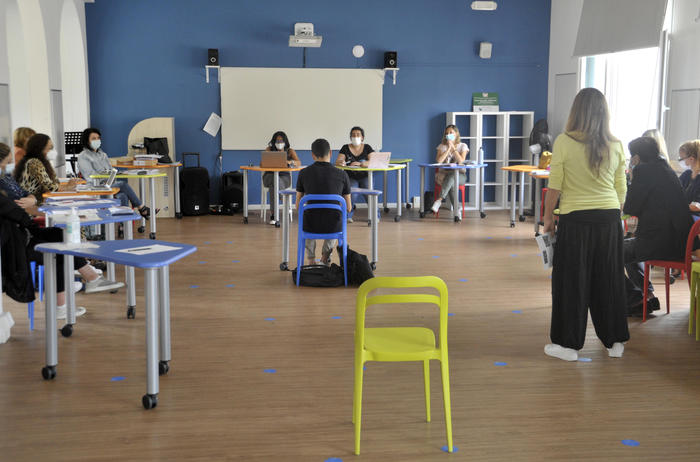Young people grow up with digital devices. But that does not mean that they also master these devices: one third of the students in Germany can hardly or only badly deal with a computer or comparable technology.
This emerges from an international comparative study on computer and information-related competences of eighth-graders. "These students can only click on links and stroke their cell phones," says Birgit Eickelmann, who is responsible for the German part of the International Computer and Information Literacy Study 2018, or ICILS 2018 for short.
That is worrying, says the Paderborn school researcher. Because this is about the future of the 14-year-olds: If a third of the students lacked basic skills for the future, that would be "a bit dramatic".
Germany is even mediocre in international comparison. In some other countries it looks even worse: among the students of the twelve participating countries and Moscow and North Rhine-Westphalia as additional measuring groups, a total of 43 percent are not sufficiently able to use digital media to research, design and communicate information and this to successfully participate in life at school or in society.
Competences of the students in an international comparison
Mean of the credit points
| Attendees | girl | Boys | total |
|---|---|---|---|
| Denmark | 561 | 545 | 553 |
| Moscow | 552 | 546 | 549 |
| Republic of Korea | 563 | 524 | 542 |
| Finland | 545 | 516 | 531 |
| USA* | 531 | 508 | 519 |
| Germany | 526 | 511 | 518 |
| Portugal | 522 | 511 | 516 |
| North Rhine-Westphalia | 517 | 513 | 515 |
| Comparison group EU | 518 | 499 | 509 |
| France | 511 | 487 | 499 |
| Internat. Average | 505 | 488 | 496 |
| Luxembourg | 494 | 471 | 482 |
| Chile | 480 | 472 | 476 |
| Italy | 469 | 454 | 461 |
| Uruguay | 453 | 448 | 450 |
| Kazakhstan | 399 | 391 | 395 |
* The overall student and school participation rate is below the 75 percent target set.
<407 points = no basal knowledge
407-491 points = basal knowledgeSource: ICILS 2018
The makers of the ICILS 2018 have for their study around 46,000 students at more than 2,200 schools solve computer-aided tasks. The eighth graders are the best in Denmark and South Korea, with Kazakhstan ranking at the bottom of the scale.
Much more important than the difference between the countries, however, is the difference within the countries, says study director Dirk Hastedt, who coordinated the investigations internationally.
Only 22 percent of the students - in Germany almost 24 percent - can solve the required tasks accordingly without support. It's frightening how many students are already using the computer, said Hastedt.
Success or failure is also closely linked to the parents' home when it comes to digital literacy - an effect that can be observed again and again in the field of education. The students' socioeconomic status is linked to a digital divide. Young people from a less privileged home are therefore significantly worse off.
It was "unacceptable that there is still a strong connection between social origin and the competent handling of young people with the digital media," says Federal Education Minister Anja Karliczek. The Education and Training Association (VBE) says it is devastating that the difference has not diminished.
Catching up with the equipment
In 2013, the study was conducted for the first time. The students in Germany have therefore held their mediocre level accordingly - but they would have to actually improve, says school researcher Eickelmann. After all, digitization has been an issue for many years, and there have been various measures to improve it in the federal states.
The equipment has indeed done something. For example, since 2014, the number of schools that can provide entire class sets of tablets or smartphones for their students has almost tripled from 12 percent to 34 percent since 2014.
more on the subject
However, Germany is still relatively poor: Only a little more than a quarter of the eighth-graders visit, for example, a school with Internet access for all. More internationally, the proportion is almost 65 percent, according to the study.
Technology alone does not help
However, the study clearly shows that equipping students or teachers with technology alone is not enough to improve their digital skills. Although most students have access to software-related learning resources, according to the survey. But students should be taught the effective use of computers.
Here the students in Germany perform particularly badly:
- Only 66 percent say the school has taught them to use technology to find information. The international average is 74 percent.
- Only 39 percent say they learned at school if information on the internet is credible. In international comparison, there are 65 percent.
With all the stoppage that the study documents, there is also a positive aspect, says Eickelmann. The commitment in the schools has changed. More and more school administrators set themselves education goals in relation to digitization. Five years ago there were only a few lighthouse projects.
Warning about pseudo-digitization
And the teachers are increasingly using the offers. The proportion of educators using digital media on a daily basis was one quarter, and in the first study it was still ten percent. However, the effort is far from innovative: nearly half of teachers say they use digital media in the classroom to present information in the classroom.
That's why Eickelmann warns against pseudo-digitization: "So far, there's not much going on with the students." In Germany, the debate has always turned to the equipment too much. It must now be about teaching the technology and modernizing the lessons.
more on the subject
Since the beginning of this year, billions are available to schools through the digital pact school. However, according to Eickelmann, they must be careful that they put the money not only in the equipment, but also in the training. So far, there is still lack of suitable pedagogical concepts for the use of the media.
In international comparison, Germany is always the rabbit who loses in the race against the hedgehog, says Eickelmann. "We always strive, and when we arrive, the others have overtaken us again."
More about the study
Who conducted and funded the study?
The ICILS study comes from the International Association for the Evaluation of Educational Achievement (IEA), which also coordinates other comparative studies such as Timss or Igloo. The Paderborn school researcher Birgit Eickelmann is responsible for the German part. Germany's participation in the study is funded by the Federal Ministry of Education and Research.
How was the data collected?
In Germany, the nationwide representative sample comprised 3655 eighth grade students and 2386 teachers teaching eighth grade. The tests and surveys were conducted in spring and early summer 2018.
This is also shown by a special survey on "Computational Thinking". Since everyday life is increasingly shaped by algorithms, it was examined whether the students can empathize with this thinking. They could not do it and cut well below the international average. In many countries, the topic is already part of curricula, says Eickelmann. In Germany, however, there is still "much potential for action and development".









